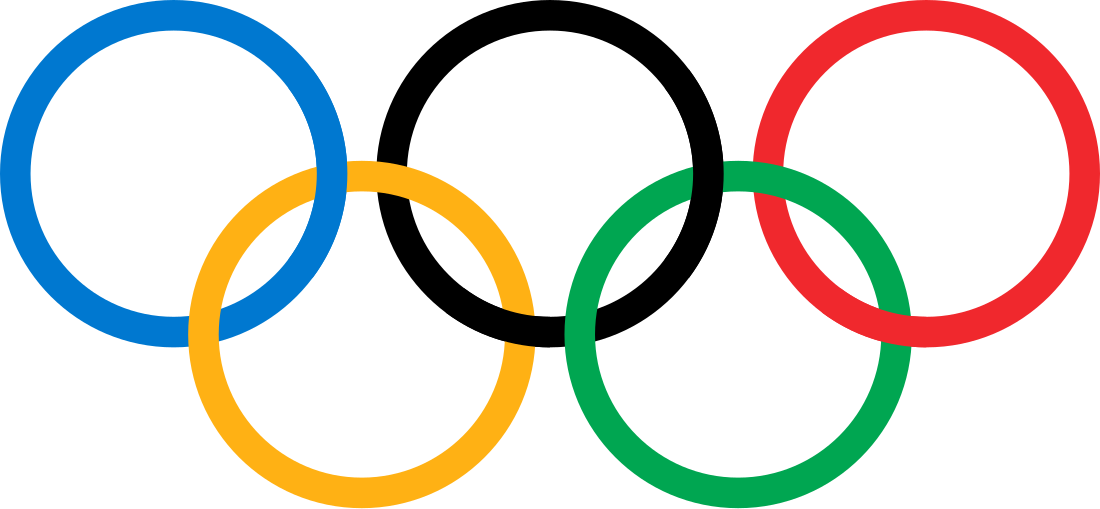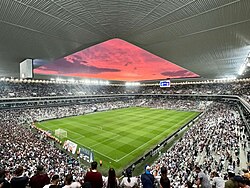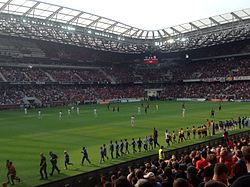Top Qs
Timeline
Chat
Perspective
Football at the 2024 Summer Olympics – Men's tournament
From Wikipedia, the free encyclopedia
Remove ads
The men's football tournament at the 2024 Summer Olympics was held from 24 July to 9 August 2024.[1] It was the 28th edition of the men's Olympic football tournament. Together with the women's competition, the 2024 Summer Olympics football tournament was held at seven stadiums in seven cities in France. Teams participating in the men's competition were restricted to under-23 players (born on or after 1 January 2001) with a maximum of three overage players allowed.
Remove ads
Brazil were the two-time defending champions, having won in 2016 and 2020, but did not qualify for this tournament.[2]
Spain won their second gold medal and first since 1992, defeating hosts France 5–3 after extra time in the final, held at Parc des Princes in Paris.[3]
Remove ads
Schedule
The schedule was as follows.[4]
| G | Group stage | ¼ | Quarter-finals | ½ | Semi-finals | B | Bronze medal match | F | Gold medal match |
Qualification
Summarize
Perspective
In addition to host nation France, fifteen men's national teams qualified from six separate continental confederations. The Organising Committee for FIFA Competitions ratified the distribution of spots at their meeting on 24 February 2022.[5]
Remove ads
Venues
Squads
Each team had to submit a squad of eighteen players, two of whom had to be goalkeepers, with at least fifteen born on or after 1 January 2001, and three who could be older dispensation players. Additionally, each team could also have a list of four alternate players, who could replace any player in the squad in case of injury during the tournament.[6]
Remove ads
Match officials
Summarize
Perspective
On 3 April 2024, FIFA released the list of match referees that would officiate at the Olympics.[7]
Remove ads
Draw
Summarize
Perspective
The draw for the groups was held on 20 March 2024, 20:00 CET (UTC+1), at the Pulse building in Saint-Denis, France.[8] The sixteen teams were drawn into four groups of four teams each. The hosts France were automatically seeded into Pot 1 and placed into the first position of Group A, while the remaining teams were seeded into their respective pots based on their results in the last five Men's Olympic Football Tournament (with more recent tournaments weighted more heavily), as follows:[9][10]
- 2004 Men's Olympic Football Tournament: 20% value of total points;
- 2008 Men's Olympic Football Tournament: 40% value of total points;
- 2012 Men's Olympic Football Tournament: 60% value of total points;
- 2016 Men's Olympic Football Tournament: 80% value of total points;
- 2020 Men's Olympic Football Tournament: 100% value of total points.
Furthermore, five bonus points were added to each of the six continental champions from the qualifying tournaments.[10]
Notes
- As the three teams qualified through the AFC U-23 Asian Cup were to be known only after the draw, placeholders were allocated according to the ranking of the AFC teams in the 2020 Men's Olympic Football Tournament, i.e. the results of Japan, South Korea, and Australia in the previous 5 Men's Olympic Football Tournament were taken into account. The placeholders were named “AFC 1”, “AFC 2” and “AFC 3”.[10]
- As the AFC–CAF play-off was to be played after the draw, the placeholder was allocated to Pot 4 and would not be drawn into a group already containing an AFC or CAF team.[10]
The draw started with teams from Pot 1 being drawn first and placed in the first position of their groups (hosts France automatically assigned to A1). Then the teams from Pot 2 were drawn, followed by Pot 3 and Pot 4, with each team also being drawn to one of the positions within their group. No group could contain more than one team from each confederation.[11] The ceremony was hosted by the local presenter Fabien Leveque and conducted by FIFA's Director of Tournaments Jaime Yarza and Chief Women's Football Officer Sarai Bareman, with the former Argentine footballer Javier Saviola and French track and field legend athlete Marie-José Pérec as draw assistants.[12]
The draw resulted in the following groups:[13][14]
Notes
Remove ads
Group stage
Summarize
Perspective
The competing countries were divided into four groups of four teams, denoted as groups A, B, C and D. Teams in each group played one another in a round-robin basis, with the top two teams of each group advancing to the quarter-finals.
All times are local, CEST (UTC+2).[15]
Tiebreakers
The ranking of teams in the group stage was determined as follows:[6]
- Points obtained in all group matches (three points for a win, one for a draw, none for a defeat);
- Goal difference in all group matches;
- Number of goals scored in all group matches;
- Points obtained in the matches played between the teams in question;
- Goal difference in the matches played between the teams in question;
- Number of goals scored in the matches played between the teams in question;
- Fair play points in all group matches (only one deduction could be applied to a player in a single match):
- Yellow card: −1 point;
- Indirect red card (second yellow card): −3 points;
- Direct red card: −4 points;
- Yellow card and direct red card: −5 points;
- Drawing of lots.
Group A
Group B
Source: FIFA
Notes:
Notes:
Group C
Source: FIFA
Attendance: 20,658[31]
Referee: Campbell-Kirk Kawana-Waugh (New Zealand)
Group D
Source: FIFA
Remove ads
Knockout stage
Summarize
Perspective
In the knockout stage, if a match was level at the end of normal playing time, extra time was played (two periods of 15 minutes each) and followed, if necessary, by a penalty shoot-out to determine the winner.[6]
Bracket
| Quarter-finals | Semi-finals | Gold medal match | ||||||||
| 2 August – Bordeaux | ||||||||||
| 1 | ||||||||||
| 5 August – Décines-Charpieu | ||||||||||
| 0 | ||||||||||
| 3 | ||||||||||
| 2 August – Marseille | ||||||||||
| 1 | ||||||||||
| 1 (5) | ||||||||||
| 9 August – Paris | ||||||||||
| 1 (4) | ||||||||||
| 3 | ||||||||||
| 2 August – Paris | ||||||||||
| 5 | ||||||||||
| 4 | ||||||||||
| 5 August – Marseille | ||||||||||
| 0 | ||||||||||
| 1 | ||||||||||
| 2 August – Décines-Charpieu | ||||||||||
| 2 | Bronze medal match | |||||||||
| 0 | ||||||||||
| 8 August – Nantes | ||||||||||
| 3 | ||||||||||
| 0 | ||||||||||
| 6 | ||||||||||
Quarter-finals
Semi-finals
Attendance: 59,882[44]
Bronze medal match
Gold medal match
Remove ads
Statistics
Goalscorers
There were 96 goals scored in 32 matches, for an average of 3 goals per match.
8 goals
6 goals
5 goals
3 goals
2 goals
1 goal
 Claudio Echeverri
Claudio Echeverri Ezequiel Fernández
Ezequiel Fernández Luciano Gondou
Luciano Gondou Giuliano Simeone
Giuliano Simeone Ángel Montes de Oca
Ángel Montes de Oca Rafael Núñez
Rafael Núñez Ahmed Koka
Ahmed Koka Mahmoud Saber
Mahmoud Saber Maghnes Akliouche
Maghnes Akliouche Loïc Badé
Loïc Badé Désiré Doué
Désiré Doué Arnaud Kalimuendo
Arnaud Kalimuendo Alexandre Lacazette
Alexandre Lacazette Enzo Millot
Enzo Millot Kiliann Sildillia
Kiliann Sildillia Amadou Diawara
Amadou Diawara Ali Jasim
Ali Jasim Omri Gandelman
Omri Gandelman Oscar Gloukh
Oscar Gloukh Mao Hosoya
Mao Hosoya Cheickna Doumbia
Cheickna Doumbia Ilias Akhomach
Ilias Akhomach Bilal El Khannouss
Bilal El Khannouss El Mehdi Maouhoub
El Mehdi Maouhoub Akram Nakach
Akram Nakach Amir Richardson
Amir Richardson Matthew Garbett
Matthew Garbett Jesse Randall
Jesse Randall Ben Waine
Ben Waine Fabián Balbuena
Fabián Balbuena Julio Enciso
Julio Enciso Diego Gómez
Diego Gómez Sergio Gómez
Sergio Gómez Miguel Gutiérrez
Miguel Gutiérrez Samu Omorodion
Samu Omorodion Marc Pubill
Marc Pubill Abel Ruiz
Abel Ruiz Juanlu Sánchez
Juanlu Sánchez Ihor Krasnopir
Ihor Krasnopir Dmytro Kryskiv
Dmytro Kryskiv Valentyn Rubchynskyi
Valentyn Rubchynskyi Paxten Aaronson
Paxten Aaronson Gianluca Busio
Gianluca Busio Walker Zimmerman
Walker Zimmerman Alisher Odilov
Alisher Odilov Eldor Shomurodov
Eldor Shomurodov
1 own goal
Source: FIFA
Final ranking
As per statistical convention in football, matches decided in extra time are counted as wins and losses, while matches decided by penalty shoot-outs are counted as draws.
Remove ads
See also
References
Notes
External links
Wikiwand - on
Seamless Wikipedia browsing. On steroids.
Remove ads









